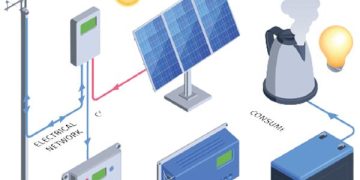In the vibrant tapestry of homeownership, first-time buyers often find themselves navigating a maze of choices, each decision carrying the weight of future sustainability and economic prudence. Among these choices, the prospect of solar energy emerges not just as an environmental imperative but as a beacon of financial opportunity. As the sun rises on a new era of eco-conscious living, solar incentives offer a compelling narrative for first-time homeowners, transforming rooftops into powerhouses of potential. This article delves into the array of solar incentives available, illuminating the path for those eager to embrace renewable energy while embarking on their homeownership journey. Through an exploration of financial benefits, government programs, and long-term savings, we unravel the complexities and unveil the opportunities that await beneath the sunlit promise of solar energy.
Unlocking the Sun: Understanding Solar Incentives for New Homeowners
Embracing solar energy is not just an environmentally conscious decision; it’s a savvy financial move for first-time homeowners. Navigating the array of incentives available can be daunting, but understanding these benefits can significantly ease the transition to renewable energy. From federal tax credits to state-specific rebates, these incentives are designed to make solar power more accessible and affordable. Federal Solar Investment Tax Credit (ITC) allows you to deduct a substantial percentage of your solar installation costs from your federal taxes, making it one of the most impactful incentives available.
- State Rebates and Tax Credits: Many states offer additional rebates or tax credits to complement federal incentives, reducing the upfront cost of solar systems.
- Net Metering: This program enables you to earn credits on your electric bill for excess energy your solar panels generate and send back to the grid.
- Property Tax Exemptions: While solar installations can increase your property value, certain states offer exemptions so your property taxes don’t rise as a result.
- Performance-Based Incentives (PBIs): These are payments based on the energy your solar system produces, offering a steady income stream post-installation.
Understanding and leveraging these incentives not only minimizes initial expenses but also maximizes long-term savings, making the shift to solar power a practical and rewarding decision for new homeowners.

Navigating Tax Credits and Rebates for Solar Savings
For first-time homeowners diving into the realm of solar energy, understanding the landscape of tax credits and rebates can unlock substantial savings. Federal tax credits are a great starting point, offering a percentage off the cost of installing solar panels. These credits can be directly deducted from your federal taxes, reducing the overall financial burden of your investment. As you explore further, you may find that many states provide additional state-specific incentives, including rebates or tax exemptions, which can significantly lower upfront costs.
Moreover, some utility companies offer their own incentives to encourage solar adoption, such as performance-based incentives or net metering programs. These programs may allow you to earn credits for excess energy generated by your system. Here are a few potential benefits to explore:
- State and Local Rebates: Check if your state or municipality offers cash rebates for installing solar systems.
- Sales Tax Exemptions: Some states waive sales tax on the purchase of solar equipment.
- Property Tax Exemptions: Installing solar panels may not increase your property taxes, even though it boosts your home’s value.
Each incentive can contribute to making solar energy a more accessible and economically viable option for new homeowners eager to embrace sustainable living.

Choosing the Right Solar Program for Your First Home
As a first-time homeowner, navigating the myriad of solar programs available can be overwhelming, but choosing the right one is crucial for maximizing your investment and ensuring long-term energy savings. When selecting a solar program, consider factors such as the size of your home, your energy consumption habits, and the specific solar incentives available in your area. It’s important to evaluate whether you want to purchase your solar panels outright, lease them, or enter a power purchase agreement (PPA). Each option has its pros and cons, such as upfront costs, maintenance responsibilities, and the ability to take advantage of tax credits.
To make an informed decision, look for programs that offer:
- State and Federal Tax Credits: Many governments provide tax incentives that can significantly reduce the cost of solar panel installations.
- Rebates: Some utility companies offer cash rebates to offset installation expenses.
- Net Metering: This allows you to sell excess energy back to the grid, reducing your utility bill.
- Low-Interest Loans: Financing options that help spread out the cost of your solar investment.
Understanding these components will help you choose a solar program that not only meets your energy needs but also aligns with your financial goals as a new homeowner.

Maximizing Benefits: Tips for First-Time Solar Adopters
As a first-time homeowner, stepping into the world of solar energy can be both exciting and overwhelming. With the right approach, you can maximize the benefits and make the most of available solar incentives. Here are some key tips to help you navigate this journey:
- Research Local Incentives: Each state and municipality offers different incentives. It’s crucial to explore options such as tax credits, rebates, and performance-based incentives specific to your location.
- Understand Federal Tax Credits: The federal government provides a solar Investment Tax Credit (ITC), which allows you to deduct a significant percentage of your solar installation costs from your federal taxes. This can lead to substantial savings.
- Explore Financing Options: Look into various financing methods like solar loans, leases, or Power Purchase Agreements (PPAs) to find the one that aligns with your financial situation and goals.
- Consider Net Metering: Many states offer net metering programs that allow you to sell excess energy back to the grid. This can significantly reduce your utility bills and enhance your return on investment.
By taking advantage of these strategies, you can not only reduce your initial costs but also enjoy long-term savings and contribute to a sustainable future.
Concluding Remarks
As the sun sets on our exploration of solar incentives for first-time homeowners, it becomes clear that the path to a sustainable future is not just paved with good intentions, but also with tangible opportunities. These incentives illuminate the way, offering both financial relief and environmental responsibility to those stepping into homeownership for the first time. By harnessing the power of the sun, new homeowners can transform their living spaces into beacons of innovation and eco-consciousness. As you embark on this exciting journey, remember that every solar panel installed is a step towards a brighter, more sustainable tomorrow. The decision lies in your hands, and with it, the promise of a future powered by the very energy that rises with each new day.


































